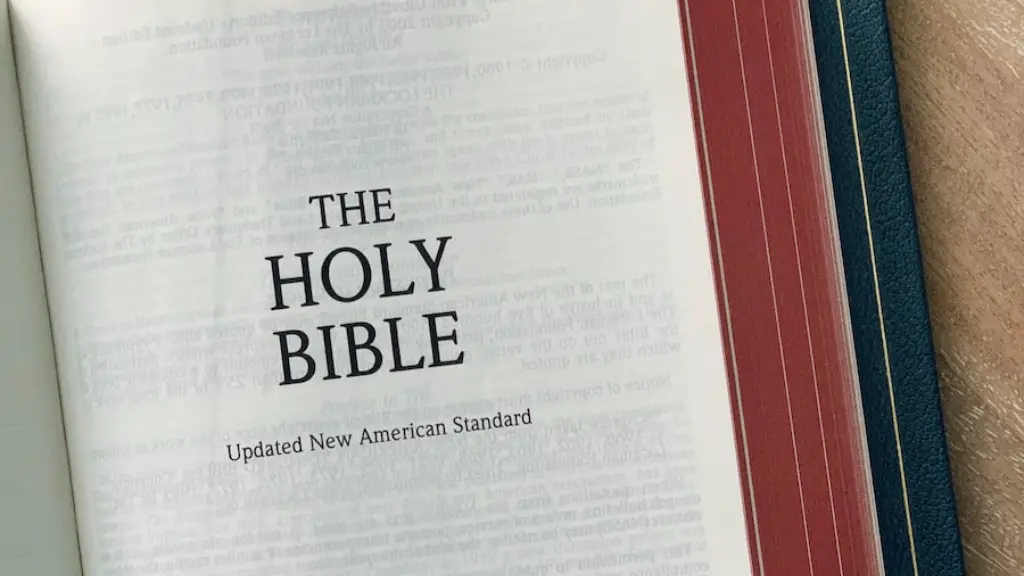The Bible – both Old Testament and New Testament – contains some verses that talk about how to treat a “slave” or a person in servitude. Depending on the translation, the term “slaves” can be referred to as “servants,” “bondservants,” or “hired servants.” Of course, these verses have been subject to a great deal of debate and discussions due to their outdated perceived notions of servitude as appropriate for certain situations.
According to biblical scholars, the scripture does not advocate for slavery. Instead, it is believed to be written to instruct those who, historically, have been in positions of power over those who were, due to certain circumstances, in positions of servitude. It is argued that the Bible is an example of literature that advocated, out of necessity, a set of people pleaser values, while advocating wise and reasonable laws and regulations to protect those in servitude.
Among the most prevalent teachings in the Bible is how to treat a “slave” or a person in servitude. The book of Leviticus states that “servants and slaves must be treated with dignity and respect.” It further states that a master must not “treat his servant or maid harshly” and that a servant should not be “embittered.” These verses suggest that slave owners should and must treat those in servitude with respect and kindness.
According to biblical scholars, it is important to remember that slavery was a fact of life in many of the regions in which the Bible was written. This means that although the practices were not endorsed and were likely seen as an inevitable evil by modern eyes, the text still uses these references in order to provide practical instructions.
The Bible advocates the freeing of slaves and the release of anyone bound in servitude in order to show mercy, as demonstrated in the book of Exodus. However, despite this, and the prevalence of the texts of instruction, slavery continued to exist, as affirmed by cultural anthropologists and biblical scholars.
Despite continued prevalence, slavery in the Bible is highly regulated and there are rules that govern the relationship between a slave and a slave-owner. Rules for the treatment of a slave, for example, are outlined in the book of Deuteronomy. These include the prohibition of getting angry at a slave, the restriction of their labour, and the protection of their contract with their owner. In this, the Bible seeks to protect human rights, even as it acknowledges the rampant situation of slavery at the time in which it was written.
Treatment of Slaves in Historical Context
It is important to look at the treatment of slaves in the historical context in order to properly understand the verses regarding slavery in the Bible. Slavery was a fact at the time and it was accepted by many in various societies. Historically, people were seen as property, which were bought, sold, and exchanged as part of economic transactions. Although the Bible wasn’t written to condone or glorify slavery, its accepted presence in society could not be ignored.
In ancient Near Eastern cultures, there were different forms of slavery that could result from birth, debt, and warfare. Depending on the circumstances and type of servitude, a certain slave could have certain rights; however, such rights varied on a case-by-case basis and were largely dependent on their master’s willingness to extend certain privileges.
This is why verses like the book of Exodus 22:18—“Do not allow a widow or an orphan to be mistreated”—were included in the Bible. It highlighted states of servitude and established a framework that offered protection to those in vulnerable positions.
Additionally, although a hard notion to accept, if one was a captive, they were made a slave. This happened due to warfare, which was a major source of slavery. In these cases, the captor would take their prisoner, who became the property of the captor. It was the nature of the battle and was a law of the territory. According to Deuteronomy 21:10-14, there were rules in the Israelite government in how to treat those captured in battle.
What Do We Learn From the Bible?
If nothing else, we can learn from the Bible that we must look at the world’s struggles in the historical context. In light of this, we learn that although slavery was pervasive and accepted, it could not be accepted as a practice that promoted human dignity.
We learn from the Bible that although there were different forms of servitude, none of them should have been exploitative. The Bible encourages treating slaves kindly and would add what today would be considered elements of human rights – such as not mistreating the widows and orphans, and not exploiting them.
Finally, we learn that slavery was not to be seen as a source of profit, but rather a system of justice and balance. The Bible calls out mistreatment and advocates for the fair treatment of those in servitude.
Treatment of Slaves in the Modern Day
Although slavery and servitude still take place in various forms, advancements in human rights have allowed us to view slavery in the context of the 21st century.
The United Nations Universal Declaration of Human Rights of 1948 declared that “no one shall be held in slavery or servitude” and these points have been reiterated in global legislation ever since. This was initially seen as a positive move, offering an option for those in servitude to be free, yet the modern-day reality for some is still filled with exploitation and abuse.
Organizations such as the International Labour Organization, Anti-Slavery International, and Justice Works have been established to bring awareness to the causes of global human trafficking and exploitation, as well as to create legal pathways to abolishing them.
Efforts such as these are essential in order to continue to establish and enforce the rights of people everywhere, as well as to bring traffickers and exploiters to justice.
Intersectionality of Slavery and Christianity
Slavery is an intersection of Christianity and politics, which can be seen in the complexity of the mixed legacy it has left on everyone’s hearts and minds. This legacy touches upon the ways in which people of faith can and should relate to those who are in servitude.
Modern scholarship and the church both reflect on the past and try to bring change and renewal in the present. They seek to help those who are vulnerable and to confront and combat human trafficking and exploitation.
In this, the Christian faith has a unique role, as it is rooted in justice and kindness. The Bible serves as a reminder that people of faith should see the world with a much broader worldview and lead with compassion, mercy, and justice. Furthermore, while recognising that there are people in need of help, we must also acknowledge those who are vulnerable to exploitation and those who are already in servitude.
Challenges and How to Address
There are particular challenges that arise when trying to address slavery and servitude in the 21st century – from the psychological trauma of those in servitude to the financial gain of those in positions of power. To successfully address these realities, there must be collaborative efforts across industries and government, as well as across private and public organisations.
Further, public education on slavery and exploitation is necessary in order to build awareness and compassion. Additionally, proactive efforts should be encouraged, such as reporting suspicious activities, offering financial and emotional support, and creating restorative spaces.
Finally, the church has a unique opportunity to bring a spiritual perspective to this issue that can not only create meaningful dialogue but also an understanding of alienation, societal structures, and the courage to take a stand against injustice. When these elements are combined, there can be real and lasting change.
Role of the Church
The role of the church when it comes to eradicating slavery and servitude has been called into question for a long time. While it is true that the Bible does contain verses about slavery, it is important to remember that the church should use its illuminative power to bring attention to the plight of those in servitude and to take actions to stop slavery’s grip.
The church is also a place for healing and sanctuary for those who have been exploited. It must take a stand against all forms of exploitation; this includes being a safe place for survivors of exploitation to heal and to seek help. The church, through its liturgies, ministries, and other outlets, can create a safe haven and provide a space for victims and those in servitude to feel seen and cared for.
The church’s role ultimately comes down to how it chooses to bring justice and compassion to those in servitude. It should actively seek out and celebrate those organizations, individuals, and entities that are working to end exploitation and create meaningful interventions. Further, the church should create and advocate for legislative and policy changes that will protect those in servitude and bring justice to traffickers and exploiters.





